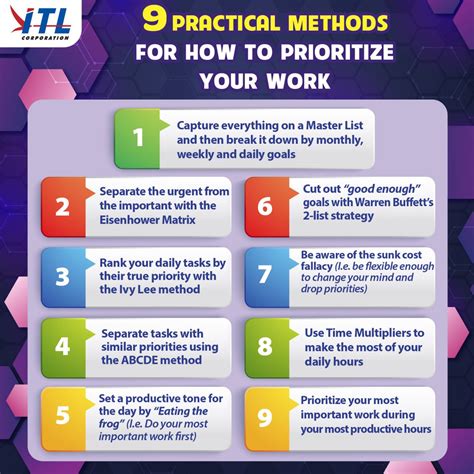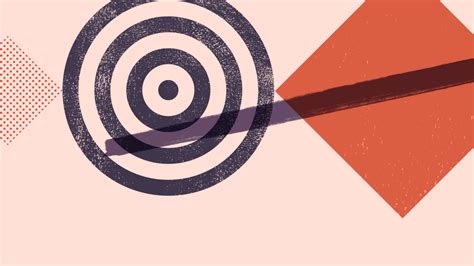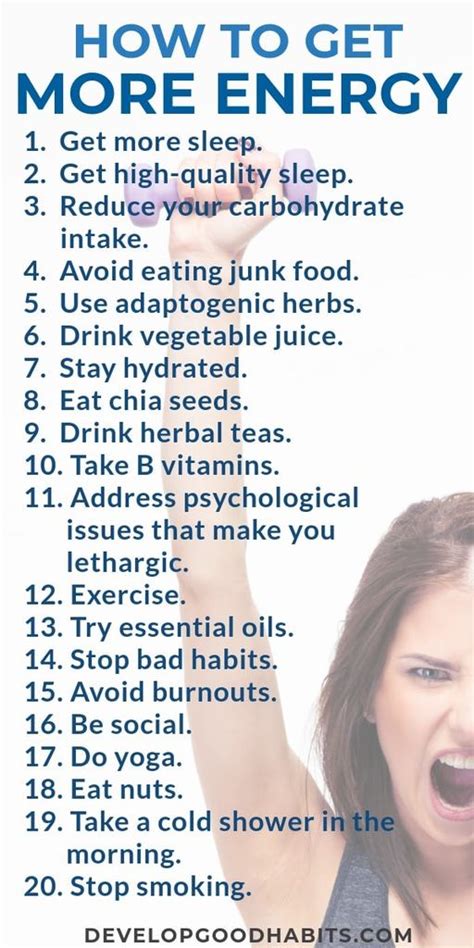Striving to accomplish more during your workday is a common ambition shared by many professionals. Mastering the art of optimizing your productivity can bring numerous benefits, such as increased job satisfaction, a reduced feeling of overwhelm, and even potential career advancements. To help you excel in your role and make the most out of your time at work, here are some valuable pointers that can propel your efficiency to new heights.
Find Your Focus: Concentration is key to accomplishing tasks effectively. Minimizing distractions allows you to direct your attention towards the task at hand, enabling you to complete it more efficiently. Consider eliminating unnecessary interruptions, such as social media notifications, by enabling a dedicated work mode on your devices, or by finding a quiet area where you can fully immerse yourself in your work.
Optimize Task Management: Developing a structured approach to managing your tasks is vital. Prioritize your responsibilities by creating a to-do list and categorizing tasks based on urgency and importance. This will provide you with a clear roadmap of what needs to be done and help you stay organized throughout the day. Additionally, consider utilizing time management techniques, such as the Pomodoro Technique, to enhance your focus and improve your productivity.
Embrace Effective Communication: Clear and concise communication is essential in any workplace setting. Miscommunication can lead to misunderstandings, delays, and ultimately hinder your efficiency. Ensure that you have a thorough understanding of instructions and expectations by seeking clarification when necessary. Moreover, make an effort to enhance your active listening skills, as this will not only facilitate better communication but also help you build stronger relationships with your colleagues.
Prioritize Your Tasks to Stay Focused and Organized

Increase your efficiency and effectiveness in the workplace by implementing a strategic approach to task prioritization. By organizing your workload and staying focused on the most important tasks, you can ensure that you make the most of your time and achieve optimal productivity. Here are some valuable techniques to help you prioritize your tasks and stay on track towards meeting your goals.
Create a Task List: Start by listing all the tasks you need to accomplish in a given timeframe. Be specific and detailed, breaking down larger projects into smaller, manageable tasks. This will provide you with an overview of your workload and allow you to better understand the priorities.
Evaluate Importance and Urgency: Once you have your task list, assess each item's importance and urgency. Consider the impact of completing or not completing the task and how time-sensitive it is. This evaluation will help you determine the order of priority for each task.
Use Time Management Techniques: Implement time management techniques, such as the Eisenhower Matrix or the ABC method, to categorize tasks based on their importance and urgency. This helps you distinguish between tasks that are critical and those that can be delegated or postponed.
Focus on One Task at a Time: Avoid multitasking as it can lead to decreased productivity and increased errors. Instead, concentrate on one task at a time, dedicating your full attention and effort to completing it before moving on to the next one.
Utilize Tools and Technology: Take advantage of productivity tools, task management apps, and digital calendars to help you stay organized and on top of your priorities. These tools can provide reminders, deadlines, and progress tracking, enabling you to effectively manage your tasks.
Regularly Review and Adjust: As your workload evolves, regularly review and adjust your task priorities. New tasks may arise, or existing ones may require reprioritization based on changing circumstances. Stay flexible and adapt your approach to ensure you consistently focus on the most important and urgent tasks.
By prioritizing your tasks, you can maintain focus, increase efficiency, and ultimately boost your overall productivity at work. Don't let the overwhelming nature of your workload hinder your performance, take control by implementing effective task prioritization strategies.
Mastering Time Management Techniques for Optimal Efficiency
In today's fast-paced corporate environment, effective time management is essential for professionals seeking to maximize their productivity and achieve their goals. By implementing proven time management techniques, individuals can optimize their efficiency, reduce stress, and accomplish more in less time.
1. Prioritize Tasks: One of the fundamental principles of time management is identifying and prioritizing tasks based on their importance and urgency. By categorizing tasks as high, medium, or low priority, individuals can focus their energy and resources on the most critical activities, ensuring that vital objectives are accomplished first.
2. Set Clear Goals: Establishing clear and specific goals provides individuals with a roadmap for their daily activities. By clearly defining what needs to be achieved, individuals can stay focused and avoid wasting time on less important tasks. Setting achievable deadlines and breaking down larger goals into smaller milestones also helps maintain motivation and momentum.
3. Eliminate Time Wasters: Identify and eliminate potential time-wasting activities that hinder productivity. This may include excessive social media usage, unnecessary meetings, or engaging in non-work-related tasks during working hours. By minimizing distractions and staying disciplined, individuals can reclaim valuable time for more important tasks.
4. Utilize Time Blocking: Time blocking involves allocating dedicated blocks of time for specific tasks or activities. By scheduling uninterrupted periods for focused work, individuals can maintain concentration and complete tasks more efficiently. It is also essential to include regular breaks in the schedule to prevent burnout and maintain productivity throughout the day.
5. Delegate and Collaborate: Effective time management involves recognizing when it is appropriate to delegate tasks to others or collaborate with colleagues. Delegation not only helps distribute workload but also allows individuals to focus on higher-value tasks that align with their expertise. Collaborating with colleagues also promotes efficiency through knowledge sharing and collective problem-solving.
6. Practice the Pomodoro Technique: The Pomodoro Technique is a time management method that involves working in short bursts of focused activity followed by brief breaks. By setting a timer for 25 minutes of concentrated work followed by a five-minute break, individuals can maintain productivity and prevent mental fatigue.
7. Leverage Technology: Take advantage of technology to streamline tasks and enhance productivity. Utilize productivity apps, project management tools, and calendar reminders to stay organized, track progress, and manage time effectively. However, it is crucial to use technology wisely to avoid becoming overwhelmed or distracted by its potential disruptions.
By implementing these time management techniques, professionals can optimize their efficiency, accomplish tasks more effectively, and derive greater satisfaction from their work. Through careful planning, prioritization, and the elimination of time-wasting activities, individuals can take control of their time and productivity, ultimately achieving their professional objectives.
Create an Environment That Fosters Uninterrupted Focus

Eliminating distractions and creating a workspace conducive to concentration are essential factors in maximizing productivity. By designing a distraction-free environment, you can enhance your ability to focus on tasks and optimize your work performance.
- Avoid clutter: Maintaining an organized and clutter-free workspace can have a significant impact on your ability to concentrate. Clear out unnecessary items and create designated spaces for essential items, minimizing visual distractions.
- Minimize noise: Noise can be an enormous hindrance to concentration. Consider using noise-canceling headphones or playing background music that aids focus. Designating quiet areas or scheduling time for focused work can also be effective in reducing distractions.
- Set boundaries: Establishing clear boundaries with colleagues and minimizing interruptions can help create an uninterrupted work environment. Utilize "do not disturb" signs or communicate your availability to colleagues, ensuring uninterrupted work periods.
- Create a comfortable workspace: Your physical comfort plays a significant role in your ability to concentrate. Make sure your chair, desk, and computer setup are ergonomically designed, reducing discomfort and promoting better focus.
- Manage digital distractions: In today's digital age, digital distractions can be a major obstacle to productivity. Turn off unnecessary notifications on your devices, use productivity apps to block time-wasting websites, and set specific periods for checking emails and messages.
By following these strategies and creating a workspace tailored to minimize distractions, you can optimize your concentration and achieve higher levels of productivity at work.
Recharge and Avoid Burnout: The Importance of Taking Regular Breaks
When it comes to optimizing productivity in the workplace, it's easy to focus solely on getting tasks done and checking items off your to-do list. However, what many individuals fail to recognize is the necessity of taking regular breaks to recharge and prevent burnout.
Breaks play a crucial role in maintaining focus, sustained energy levels, and overall mental well-being throughout the workday. Without incorporating moments of relaxation and rejuvenation, individuals may experience a decline in productivity and an increase in stress levels, which can ultimately lead to burnout.
- Enhanced focus: Regular breaks allow your brain to recharge, enhancing your ability to concentrate and stay focused on tasks at hand.
- Increased creativity: Stepping away from work stimulates creative thinking, enabling you to approach challenges with a fresh perspective.
- Improved decision-making: Taking breaks can help prevent decision fatigue, allowing you to make more thoughtful and efficient choices throughout the day.
- Reduced stress: Taking time to relax and recharge during breaks reduces stress levels, helping to prevent burnout and improve overall well-being.
So, how can you incorporate regular breaks into your work routine? Consider implementing strategies such as:
- Setting specific times for breaks throughout the day to ensure they are not overlooked or postponed.
- Engaging in physical activity during breaks, such as stretching or taking a short walk, to increase blood flow and refresh your mind.
- Practicing mindfulness techniques, such as deep breathing or meditation, to promote relaxation and reduce stress.
- Disconnecting from digital devices and taking moments of quiet reflection to recharge your mental energy.
Remember, taking regular breaks is not a sign of laziness or unproductivity, but rather a strategic approach to maintaining optimal mental and physical performance. By prioritizing self-care and incorporating scheduled breaks into your workday, you can boost your productivity, improve your well-being, and avoid burnout.
Developing Healthy Habits to Enhance Energy Levels and Enhance Efficiency

In the pursuit of achieving optimal productivity and success in the workplace, it is crucial to establish and nurture healthy habits that not only improve energy levels but also enhance overall productivity. By adopting healthy habits, individuals can increase their mental and physical capacities, enabling them to accomplish tasks with greater efficiency and effectiveness.
1. Prioritize Regular Exercise: Engaging in regular physical activity not only boosts energy levels but also improves concentration and focus. Incorporating exercise into your daily routine can enhance cognitive function and promote a positive mindset, enabling you to tackle complex tasks and overcome challenges more effectively.
2. Embrace Mindfulness and Meditation: Developing a regular mindfulness and meditation practice can significantly improve energy levels and productivity. By cultivating a calm and focused mind, individuals can better manage stress and distractions, leading to enhanced concentration, improved decision-making, and increased creativity.
3. Maintain a Well-Balanced Diet: The fuel for our bodies, a well-balanced diet, plays a vital role in providing the necessary nutrients and energy to sustain optimal productivity. Incorporating fruits, vegetables, whole grains, and lean proteins into your daily meals can improve cognitive function, concentration, and overall well-being, enabling you to perform at your best in the workplace.
4. Ensure Sufficient Quality Sleep: Adequate restorative sleep is essential for maintaining high energy levels and maximizing productivity. By establishing a consistent sleep routine and creating a sleep-friendly environment, individuals can experience improved focus, creativity, and decision-making, ensuring they are operating at their peak performance levels throughout the workday.
5. Foster Effective Time Management: Developing strong time management skills can enhance energy levels and productivity by optimizing how individuals allocate their time and prioritize tasks. By implementing strategies such as setting clear goals, breaking tasks into smaller actionable steps, and leveraging time-management tools, individuals can reduce stress, increase productivity, and maintain sustainable energy levels.
In summary, by incorporating these healthy habits into your daily routine, you can significantly enhance your energy levels and overall productivity. Prioritizing exercise, embracing mindfulness, maintaining a well-balanced diet, ensuring sufficient quality sleep, and fostering effective time management are key steps towards achieving optimal performance and success in the workplace.
FAQ
How can I boost my productivity at work?
There are several strategies you can use to boost your productivity at work. First, prioritize your tasks and create a to-do list. This will help you stay organized and focused. Second, minimize distractions by turning off notifications on your phone and avoiding social media during work hours. Third, take regular breaks to give your brain a rest and avoid burnout. Finally, try to delegate tasks when possible and learn to say no to unnecessary commitments.
Is it helpful to set goals for improving productivity?
Absolutely! Setting goals can significantly improve your productivity at work. When you have clear goals in mind, you are more motivated, focused, and driven. Make sure your goals are specific, measurable, achievable, relevant, and time-bound (SMART goals). Break them down into smaller, manageable tasks and celebrate your achievements along the way. Regularly reviewing and adjusting your goals will keep you on track and continuously improve your productivity.
How can I manage my time effectively to boost productivity?
Time management is crucial for maximizing productivity. Start by identifying your most important and urgent tasks and tackle them first. Set realistic deadlines for yourself and use productivity tools like calendars or task management apps to stay organized. It is also helpful to set aside specific time blocks for focused work without interruptions. Prioritize your tasks based on their importance and avoid multitasking, as it can actually decrease productivity.
What are some strategies for staying focused at work?
There are several strategies you can use to stay focused at work. First, create a conducive work environment by organizing your workspace and minimizing distractions. Use noise-cancelling headphones or find a quiet space if necessary. Second, break your work into smaller, manageable tasks to maintain a sense of progress and avoid overwhelm. Third, establish a routine and set dedicated time for deep work. Finally, practice mindful techniques such as meditation or deep breathing exercises to enhance focus and reduce stress.
How can I maintain a healthy work-life balance without sacrificing productivity?
Achieving a healthy work-life balance is essential for long-term productivity and well-being. First, establish clear boundaries between work and personal life. Avoid bringing work home and define specific time for relaxation, hobbies, and spending time with loved ones. Prioritize self-care by exercising regularly, getting enough sleep, and eating nutritious meals. Learn to delegate tasks and ask for support when needed. Finally, practice stress management techniques to prevent burnout and maintain overall productivity and happiness.



